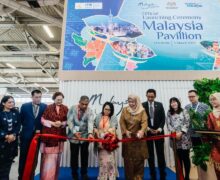Protests in Mpumalanga: tourism challenges addressed

A new forum has been created in Mpumalanga to improve communications and reactions relating to service delivery protests, as well as any other problems affecting visitors to the province.
While the recent disruptions seem largely to have come to an end, according to Kruger Lowveld Chamber of Business and Tourism (KLCBT) and Mpumalanga Tourism and Parks Agency (MPTA), the two organisations have jointly created a think tank of interested parties drawn from tourism, security structures and from provincial, district and local government to effectively deal with any possible resurgence, and to ensure that tourist safety is deemed paramount at all times.
This partnership will also include Regional Tourism Organisations in other parts of the province, being the Gert Sibande and Nkangala regions.
“It is KLCBT’s view that the problems facing our area have been somewhat exaggerated in terms of their impact on tourists,” says Oupa Pilane, KLCBT President “and that similar issues are faced in many towns and regions throughout the country. It is therefore the view of KLCBT and the members of our forum, that in addressing the situation in Mpumalanga, our aim should be for all our initiatives ultimately to be able to be rolled out nationally”.
Pilane said KLCBT would be discussing the proposal with national bodies such as the Southern Africa Tourism Services Association (Satsa), the Tourism Business Council of South Africa (TBCSA), South African Tourism, and with the Minister of Tourism, Derek Hanekom.
Pilane continued: “We would similarly like to apply to our region any successful initiatives which have been adopted in other areas. Keeping tourists safe has to be our highest priority across South Africa, especially in the run-up to the coming elections next year, and there should be absolutely no reason for visitors to be unsettled or alarmed in the process.”
According to KLCBT and MTPA, Mpumalanga already has a strong network in place to keep visitors to the region informed, with the hope that this can be further improved upon by opening up more communication channels between stakeholders.
MTPA’s Head of Tourism, Xolani Mthethwa said today’s tourists were not passive recipients of tourism services – they were active participants and they needed to be empowered with information so that they could be assured that South Africa was a safe place to visit.
Areas to be addressed by the new forum include:
- The passing of accurate and un-sensationalised information to the media from one fully informed central source.
- Monitoring of social media to ensure that inaccurate and out-of-date information is corrected.
- Prompt resolution of service delivery issues by efficient networking with forum partners in the municipalities and with the police.
- The prevention of any impact on tourists of such demonstrations and disruptions by means of increasing the spread of information networks to ensure that tourists are kept informed and steered away from any problem areas.
- Encouraging authorities to meet with communities and discuss their grievances and ensure that confrontations are avoided at all costs.
- Stepping up the existing roadside anti-corruption initiative to ensure that tourists are not inconvenienced by corrupt traffic officials.
- Deploying and training additional Tourism Safety Monitors in all the region’s tourism destinations to provide visitors with a warm welcome and up-to-date information.
- Education initiatives in rural communities, to emphasise the value of tourism to the region as an employer and as a contributor to the provincial and national fiscus.
KLCBT in partnership with MTPA will also be pushing for a national tourism safety advice app, available as a free download, both to domestic tourists and to international visitors on arrival. The app would provide up-to-date traffic information, details of recommended routes and procedures for dealing with tourism safety issues, as well as being associated with a national Tourism Safety Helpline.
“There is no reason for any visitor to this country to be alarmed or to feel unsafe at any time,” mentioned Pilane. “With our partners in our beautiful safe province of Mpumalanga, we intend to ensure that this remains the case and we very much hope that our initiatives will be rolled out nationally.”
Illana Clayton, CEO of Travel Smart Crew (TSC), added: “From our side, we behave responsibly and carefully with regard to the safety of our guests. Satsa has developed an app that makes it easier for us to do so.”
The app, called ‘Satsa’ is available to all members for download on both the iStore and Google Play Stores. It is mobile friendly and, importantly, the landing page features Security Alerts, with live push notifications.
Clayton said anyone who knew of any area affected by protest action (or any alert/concern) could send the news through to Satsa, who would update the app. Secondly, Clayton suggested that the tourism industry should use the app, as guides would have intel at their fingertips to reroute and keep guests out of affected areas.
“If the industry all start engaging with this app, it will make the world of difference in terms of effective communication. Officials and municipalities can do so much and stop so much, and it will take time. As an industry, we can make the difference immediately just through the power of communication on an app (Satsa) like this,” added Clayton.
Furthermore, Clayton suggested that the Kruger Roadside Initiative cards should be given to all guests, as they contained relevant and important telephone numbers in Mpumalanga, such as an emergency manned cellphone number for local police who can aid in the case of any roadside situation. Clayton says the cards should also be handed out to guests by every car-rental company driving to/from Mpumalanga, as well as accommodation establishments.
According to KLCBT and the MPTA, Mpumalanga remains a safe place for visitors and that these joint efforts will ensure that tourists are kept abreast of key issues, further ensuring their safety when visiting the province.
“We can’t change the situation, but we can be responsible and keep our tourists safe, our jobs safe, and our own people safe,” concluded Clayton.
source: Tourism Update





